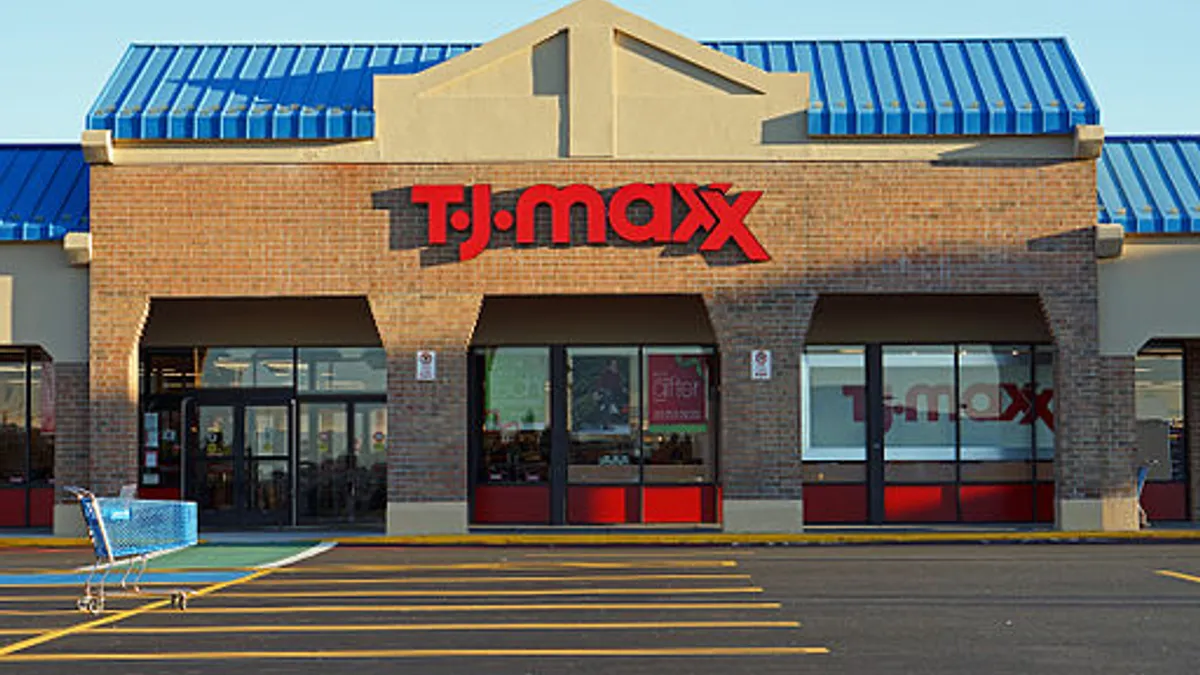Dive Brief:
- TJX Cos — operator of T.J. Maxx, Marshall's and Home Goods — reported fourth net sales of $11 billion, a 16% increase over the year-ago period. Its consolidated comparable-store sales rose 4% in the quarter. CEO Ernie Herrman said comps were driven by increases in customer traffic across the company's store brands.
- The off-price retailer's earnings per share came to $1.37 in Q4, a 33% increase buoyed by a tax benefit of 17 cents per share that the company said was related to last year's tax bill. Partly thanks to the tax cut, TJX said it plans to buy up to $3 billion of its own stock back from shareholders over the next year and has paid a one-time bonus to its associates. TJX's earnings beat the FactSet consensus, cited by MarketWatch, of $1.27. Sales also beat the FactSet consensus, by some $25 million, and the retailer's comps were nearly double the FactSet estimate of 2.1% growth. The company's stock rose 7.5% in premarket trading.
- For the full fiscal year, net sales rose 8% to $35.9 billion and comps rose 2%, the latter metric representing a slowdown from the 5% increase in the previous year. Diluted earnings per share came to $4.04, up 16.8% from the prior year.
Dive Insight:
The holiday season, which lifted many boats last year, didn't forget TJX.
The period helped TJX shake off a stumble in sales growth last year, with comps for its Marmaxx banner in line with the year-ago period and comps for the entire company up 1% year over year. (At 3%, comps at Home Goods did slowdown from 5% in the prior-year Q4.)
Neil Saunders, managing director at GlobalData Retail, described in emailed comments a "solid underlying performance" at the retailer that helped calm "spooked investors" after a Q3 flub. "In our view, TJX's update provides sufficient proof that the off-price market has not yet run out of steam," Saunders said. "[O]ur consumer data show there is still heightened interest in off-price and that the pool of consumers shopping in the channel continues to increase."
Some analysts have been expecting strong fourth quarter results from off-price retailers, including TJX Cos, Ross and Burlington.
Morgan Stanley analysts led by Kimberly Greenberger wrote in a note last week that "[g]iven the string of better-than-expected results thus far, we anticipate off-pricers will post another round of strong holiday results" with "potential gross margin upside from cleaner inventory positions and better full-price selling with cold weather earlier in the season."
Cowen analysts led by Oliver Chen last week said they anticipated comps growth of 2.4% in Q4 (which TJX handily beat) on "inventory availability, opening price point/gifting execution and exceptional non-apparel execution." Chen noted that the analysts expected full-year earnings per share guidance from the company of 5% to 6% but noted "the company has done a good job of exceeding initial 'conservative' guidance by about 3% on average."
After a "fashion misstep" at T.J. Maxx and Marshall's in the third quarter last year — that helped drag down comps to negative 1% in the unit — Chen said his team thinks the problem "is largely fixed," with Cowen's consumer tracker pointing to rising visit trends to the retailer's stores.
Greenberger called TJX "one of the most heavily debated names in the space heading in to Q4" after it posted flat comps in Q3. (As a counter-example, fellow off-pricer Ross Stores posted a 4% increase in comps in Q3.)
TJX's doldrums earlier in 2017 dragged the company's full-year performance down, leaving the off-pricer retailer with a pedestrian 2% increase in comps (which plenty of retailers would kill, maim or steal for).
Looking ahead, some analysts worry that TJX and other off-price sellers might suffer as consumers, confident in the economy, trade up in their purchases, and as the furious expansion by TJX, Ross and others catches up with them.
But Morgan Stanley analysts in a December report wrote that they expect off-price sales to keep growing. They noted that despite good economics for consumers, shoppers are still saving more as well as spending more on experiences than on retail goods. Moreover, profits in the sector are better protected from e-commerce expenses that department and specialty stores have been taking on lately as they try to compete with Amazon online.
Moody's Investors Service has also written that the discovery inherent in off-price shopping will continue to fuel off-price retail, which will see operating income growth of 5.4%, besting most of the overall sector. And analysts with JP Morgan wrote last year that they estimate off-price retailers could generate another $19 billion in incremental sales by 2021.
That growth comes primarily at the expense of department stores, which combined have lost $25 billion in sales since 2011 and are on pace to lose another $22 billion sales over the next five years, JP Morgan analysts, led by Matthew Boss, wrote last year.















